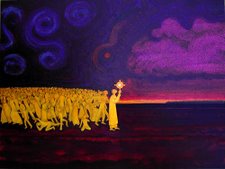 [Lots of good info in the whited hyperlinks]
[Lots of good info in the whited hyperlinks]Blueprint for Dictatorship
Recent legislation sets us up for tyranny
by Justin Raimondo, antiwar.com
[picture: Eric Drooker]
America is headed for a military dictatorship – and recent legislation makes this all but inevitable. Last September, Congress passed the Defense Authorization Act, which empowered the president to declare martial law with very little provocation, namely in the aftermath of a "terrorist attack or incident." Having determined that "the execution of the laws" is hampered by the "incident," the president can unilaterally impose martial law – without the consent of Congress, which need only be informed of the event "as soon as practicable." The only condition attached instructs the president to report to Congress after 14 days, and every 14 days thereafter.
This use of the military to enforce domestic order is a new development in American history, one that augurs a turning point not only in terms of law, but also in our evolving political culture. Such a measure would once have provoked an outcry – on both sides of the aisle. When the measure passed, there was hardly a ripple of protest: the Senate approved it unanimously, and there were only thirty-something dissenting votes in the House. Added to the Military Commissions Act [.pdf], this new brick in the wall of domestic repression creates the structure of a new imperial system on the ruins of the old constitutional order. George W. Bush and his hard-core neoconservative henchmen may have lost the war in Iraq, but they have won a virtually uncontested victory at home: the conquest of the old republic by an emerging imperial order. This recalls the opening of Garet Garrett's 1952 philippic, Rise of Empire, wherein he diagnosed the essential indeterminacy of the transition:
"We have crossed the boundary that lies between Republic and Empire. If you ask when, the answer is that you cannot make a single stroke between day and night; the precise moment does not matter. There as no painted sign to say: 'You are now entering Imperium.'"
The usually prescient Garrett got it somewhat wrong here: The single stroke between day and night can be fixed precisely in time, at 8:45 a.m. EDT on Sept. 11, 2001, and the Military Commissions Act and the disturbing changes in the U.S. Code outlined above are the closest to painted signs we are likely to get. Waiting in the wings, an infamous cabal took advantage of the 9/11 terrorist attacks, moving with preternatural speed to consolidate a dictatorship of fear. With the passage of more recent legislation, they are now moving to consolidate their gains. Sinisterly, the new legislation also alters the language of Title 10, Chapter 15, Section 333 of the U.S. Code (the so-called Insurrection Act) in an ominous manner:
"Whenever the president considers it necessary to use the militia or the armed forces under this chapter, he shall, by proclamation, immediately order the insurgents or those obstructing the enforcement of the laws to disperse and retire peaceably to their abodes within a limited time."
Why insert the bolded phrase – unless your objective is to widen the category of miscreants to include those exercising their First Amendment rights? No one expects an insurgency to be launched in this day and age in America, yet peaceably assembling to protest government policies can easily be interpreted to include "obstructionists" who might be "dispersed." As José Padilla discovered, any American can be kidnapped and held without trial – or even formal charges – on the orders of the president, and the granting of unprecedented power to rule by decree builds on this neo-royalist theory. The Bushian doctrine of the "unitary executive," which gives the occupant of the White House monarchical power in wartime, has now been approved by the Democrats, who can't wait to wield it themselves. Of course, they would exercise such unholy power only in a good way – say, if a state refused to cooperate in enforcing or implementing federal legislation instituting a draft, or, more likely, federalizing a state National Guard unit to be shipped to the Middle East.
Oh, you mean that's not so good? Just wait until the Democrats get their hands on all that power: then you'll see the real collapse of the movement to preserve civil liberties in America. Remember, it was Hillary Clinton who said of the Internet: "We are all going to have to rethink how we deal with this, because there are always competing values. There's no free decision that I'm aware of anywhere in life, and certainly with technology that's the case." Yes, the technology is very "exciting," she averred, yet "there are a number of serious issues without any kind of editing function or gatekeeping function. What does it mean to have the right to defend your reputation, or to respond to what someone says?"
The First Amendment is not big with Hillary and never has been. She's power-mad, and every once in a while the frigid mask gives way to the face of a real authoritarian, albeit a different one than that of the red-state fascists, as Lew Rockwell describes the anti-libertarian Right. Blue-state fascists trample on our civil liberties "for the children," but the effect is the same: bipartisan support for the abolition of our old republic and the inauguration of a new era in American history: the Age of Empire.
With the neoconized "conservative" movement transformed into a force fully committed to outright authoritarianism, and the "liberals" defending the depredations of the Democrats in power, who will be left to defend what's left of the Constitution? Just Ron Paul and Alexander Cockburn. The rest will go with the herd instinct of sheep threatening to stampede at the apparent intrusion of a wolf in their pasture.
Under the terms of this legislation, who defines a terrorist "incident"? The president. Who defines an "unlawful combination"? The president. Who determines that a "conspiracy" is in progress, one that threatens national security and domestic order? The president of these United States – which are to be united, in our darkest future, by a superpresident who can outlaw the opposition with the stroke of a pen and is more a military leader than the chief executive of an ostensible republic.
Stop, for a moment, and consider where we are in the spring of 2007.
On the home front, the representatives of the people have conceded the last of their waning powers to the executive branch and paved the way for the restoration of royalism in America. Overseas, American troops are fighting a war of conquest – there is no other way to describe it – in an effort to prop up a rapidly failing puppet government in the Middle East. Meanwhile, U.S. forces are gathering in the Persian Gulf for what looks to be a strike against Iran.
The unpopularity of our foreign policy is increasingly a cause for concern in the Imperial City, where both parties have colluded – with surprisingly little dissent – in ensuring a permanent U.S. military presence in the Middle East. It is merely a question of the size of our footprint that divides the two major parties on this all-important question. The Democrats want to "redeploy" – to Qatar and other neighboring countries. The Republicans won't give up an inch of conquered Iraqi territory and instead want to extend the battle into Iran, which is already the target of a not-so-covert campaign aiming at "regime change." (The Iran Freedom Support Act, authorizing millions in aid to "democratic" groups, was supported by the leadership of both parties in Congress.)
Rising antiwar sentiment worries William F. Buckley Jr., who opines that "There are grounds for wondering whether the Republican Party will survive this dilemma." Given the authoritarian proclivities of the Bush administration and the neoconized GOP, there are grounds for wondering whether the republic will survive. We are just a terrorist "incident," either real or imagined, away from a declaration of martial law and all its attendant consequences. Buckley grimly notes the polls are "savagely decisive" on the war question, and he asks: "Beyond affirming executive supremacy in matters of war, what is George Bush going to do?" The answer may be contained in Title 10, Chapter 15, Section 333.
Senators Patrick Leahy (D-Vt.) and Kit Bond (R-Mo.) are sponsoring legislation that would repeal the changes, but, as Sen. John Warner pointed out the other day, when the Insurrection Act was revised to give the president extraordinary powers, no one raised any objection. Now, suddenly, the senators, including Warner, see some reason to regret their hasty actions – do they know something we don't?
I fear, however, that it may be too late. Bush will surely veto the Leahy-Bond measure – and, if necessary, declare America's governors, who all oppose this brazen usurpation, an "unlawful combination," as the Insurrection Act puts it. Then he will be empowered to "disperse" them, and the Senate, at will.
I'm back to Garet Garrett, who never fails to come up with some apt aphoristic prognostication, this one being from his classic The Revolution Was:
"There are those who still think they are holding the pass against a revolution that may be coming up the road. But they are gazing in the wrong direction. The revolution is behind them. It went by in the Night of Depression, singing songs to freedom."
























